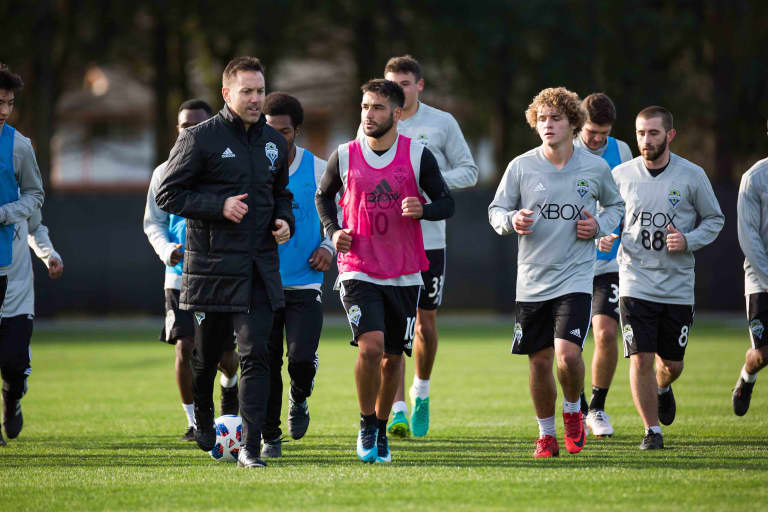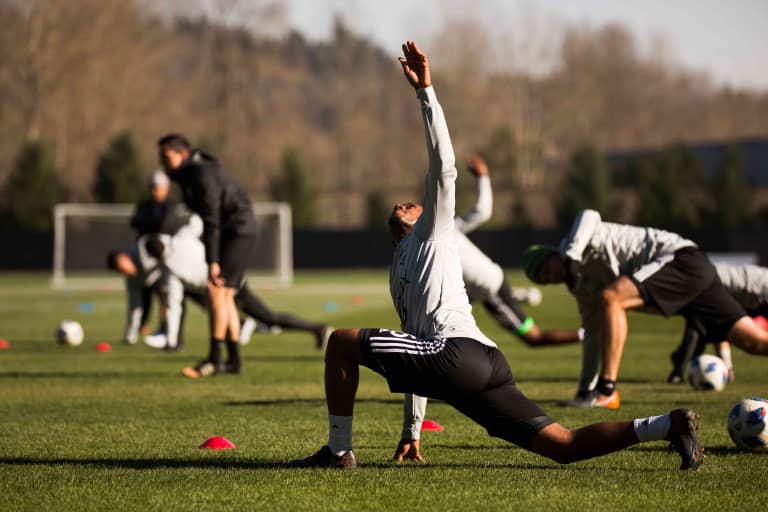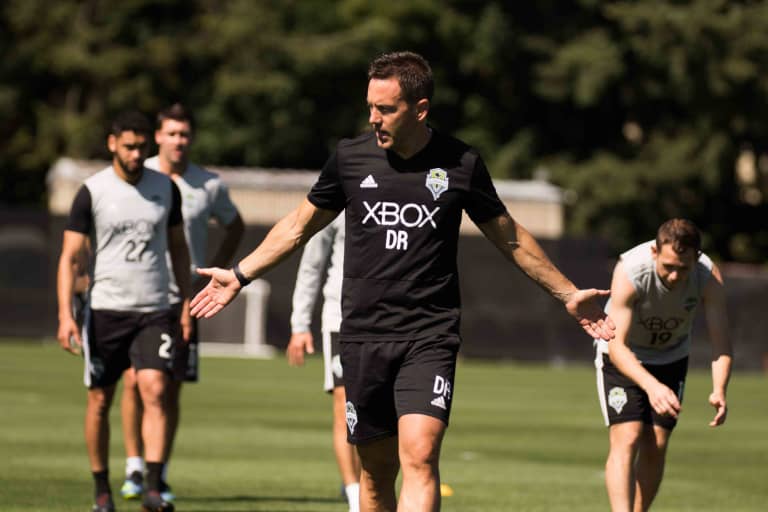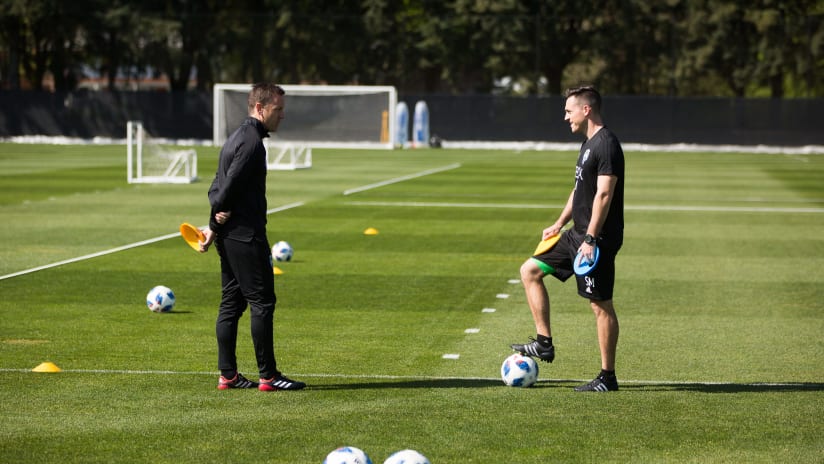This is a feature in Issue 16 of Sounders Monthly. Copies are available for free at The NINETY, GuestLink Services locations, Soccer Celebration and Membership Central. You can also access it on the Sounders Mobile App.
Head to Starfire Sports Complex in Tukwila, Wash., on any day the Seattle Sounders are training and keep your ears open. Amid the cacophony of coaches barking instructions and players communicating, listen for a steady hum, a constant buzzing. High above the practice fields, Video Analyst Tom Childs flies a drone, recording every drill, every player’s movement.
The information the drone records is used to give players and coaches comprehensive visual feedback to see what they got right and what can be improved. The drone is a massive advancement from a handheld camera on a tripod, what Childs used when he first started.
“My recollection of drone footage was from Afghanistan,” said Childs, who at one time served in the British Royal Artillery as a Lance Bombardier. “It was very shaky. But [our drone] is very still, a very stable camera with 4K footage, so it’s very good quality. You can go back 10 years and a lot of clubs didn’t have any of this stuff. The Seattle Sounders are definitely a world-leader in that sense. They embrace the data, they embrace the video and I’ve never met a staff that is this willing to take data on board in the decision-making process.”

High Performance Director Damian Roden warms up with Nicolás Lodeiro | Mike Fiechtner
The drone is relatively new, another high-tech instrument in an ever-growing collection at the club. The Sounders’ data surge has been spearheaded by Ravi Ramineni, a former Microsoft data analyst with a background in computer science who joined the club full time ahead of the 2013 season. Through his wife, Sarah, who does data analytics for English Premier League club Arsenal, he met former Sounders High Performance Director Dave Tenney. Ramineni had been interested in soccer analytics for quite some time, and he would occasionally help Tenney with special projects. The two would meet at a Starbucks, Tenney would give Ramineni raw numbers and a few weeks later they would reconvene to discuss his findings. By the end of 2012, Ramineni had quit his job at Microsoft and Tenney and the coaching staff wanted his services.
“The first year was interesting when I came in because there was no infrastructure,” Ramineni said. “There was no database or website or anything, so I started building that.”
There are three main components to Ramineni’s job. The first is helping General Manager & President of Soccer Garth Lagerwey and the scouting team find new players. The second is helping coaches and players prepare for the next opponent. And the third is general sports science and monitoring training loads. He and his team collect data through GPS and heart rate trackers, software that Ramineni created with the help of Tenney to take that information and formulate reports.
“They embrace the data, and I’ve never met a staff that is this willing to take data on board in the decision-making process.” — Video Analyst Tom Childs
Now Ramineni works closely with Tenney’s successor, Damian Roden, who joined the club from England’s Stoke City ahead of this season. While at Manchester City, Roden met Tenney and the two spent time discussing different sports science approaches and techniques.
“From afar before I came here, Seattle was the one driving the development of sports science in MLS,” said Roden. “From the manager to the general manager to the owner, they’re all invested and very open-minded in new ideas that are going to enhance the performance of the team.”

Jordan McCrary stretches before a training session | Mike Fiechtner
Roden’s main responsibility is to break the year down into smaller pieces and develop daily and weekly sessions so that throughout the season, the team starts off at a certain point and peaks during the playoffs. To do that, Roden and his staff dictate the players’ diets, what they need to do to prepare and recover from training and general exercises to improve their speed, power, strength and endurance.
“We have to plan the team component, but also consider all the individual needs, how they respond, so [Head Coach] Brian [Schmetzer] has every player available for selection on [matchday],” said Roden. “The last three or four months, we’ve been quite good at achieving that.”
Data collected from training sessions and matches goes a long way in determining how Roden approaches a given week. He utilizes “readiness testing” to see how players respond from a game, so when he wants to push them during the following week, he knows how a given player’s body has responded. It influences how hard they can go and whether they might need to ease back in order to remain healthy and available.
“From afar before I came here, Seattle was the one driving the development of sports science in MLS.” — High Performance Director Damian Roden
“For example, two players in the same position will have totally different data having done the same session, but on your eye, you know you’ve got what you wanted them to get,” Roden said. “It’s just how their body responds, and everybody is built differently. You’ve got to see it and then have the data to back it up.”
Roden works closely with Ramineni, as well as with Head Strength and Conditioning Coach Sean Muldoon and Performance Data Analyst Amber Rowell. It’s a completely interdisciplinary approach. When analyzing complex data, though, the most difficult part of Ramineni’s job is communication, how to translate information into layman’s terms for people who aren’t fluent in what can be an intricate analysis.
“The question that I always get from coaches that I’ve learned to answer first is, ‘What can I do with this?’” Ramineni said. “Instead of giving raw numbers, I always try to give a nuanced explanation. I try to see what the link is between what happens on the field and what the numbers are saying. I try to present it to them in their language. It’s a learning process.”

Roden leads a training session | Mike Fiechtner
Another question most coaches ask immediately is how to fix the problems that the data has presented. Data can be descriptive, predictive and prescriptive. Descriptive data tells what happened, while predictive data can forecast future events. Prescriptive data, how to apply what the information is saying, is the hardest one to get right.
“When Tom and I are filming the game, we don’t really get excited for every goal we score, but we get excited for every chance we create a certain way because that’s what we prescribe,” said Ramineni. “We want [the players] to repeat certain patterns or behaviors because that’s what’s going to sustain the success longer.”
“I always try to give a nuanced explanation. I try to see what the link is between what happens on the field and what the numbers are saying.” — Director of Soccer Analytics Ravi Ramineni
Ramineni is excited about where the future of technology in soccer is headed. During this past FIFA World Cup in Russia, for the first time teams were allowed direct communication between the benches and the coaches’ booth upstairs. Staffs could even send videos and pictures down to the field in real time.
“What I see 10 years from now is the head coach sitting higher because I think he gets a better view of what’s happening,” said Ramineni. “You may identify something much earlier [from above] than from field level.
“Someone like me will get more and more integrated into a coaching staff [in the future],” he added. “Right now, we have really good integration, and you’ll see that more often.”






